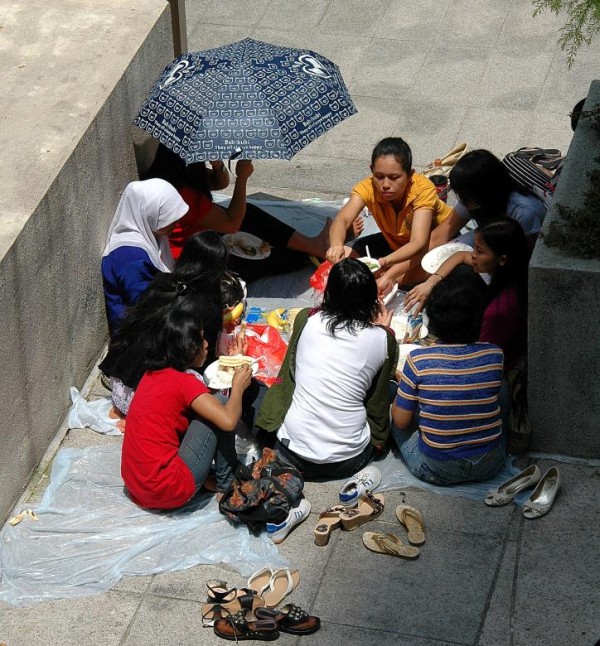In Hong Kong at the end of March, 2013,the Court of Final Appeal dismissed an appeal by Filipino domestic workers seeking permanent residency in the city. It also denied the HKSAR government’s request for referring the right of abode issue to the NPC Standing Committee for clarification, saying the necessary conditions had not been met.
Local commentators say that the right-of-abode ruling by the city’s top court has spared Hong Kong a domestic crisis, adding – least for the time being. The Court of Final Appeal ruled that foreign domestic helpers had no right to claim permanent residency – as that is a qualifying reason which is part of the parcel that their visa had appended at the time of their entry.
This oddity, to exclude one sector of the workforce, as against no such ruling for any other sector, goes against a common understanding of human rights and equality under the law.
While the media speaks of the decision quashing the hopes of hundreds of thousands who may have wanted to settle here. Many ‘maids’ themselves would disagree because they only come here for a limited duration to build up their family’s economy in the Philippines and have no intention of prolonging their stay much less wanting residency. Of course, some will want to reside in Hong Kong.
The court also rejected the government’s request to seek Beijing’s interpretation of the Basic Law, saying the abode provision was clear enough.
That the domestic helpers seeking right of abode and their supporters feel disappointed is to be expected. But the outcome is welcomed by locals who read those opinions of mass migration and thus fear that the rights and benefits shared by ‘outsiders’ would water down what they can receive. Now that a final ruling has been made, it has to be respected. But it’s not over yet.
An editorial in the South China Morning Post (SCMP) states that unlike the permanent residency given to foreigners who have lived in the city for seven years or more, the court said domestic helpers faced many restrictions and were therefore not qualified as “ordinarily” residing in the city under Article 24 of the Basic Law. The nature of their residence, according to the judges, is highly restrictive in that they are required to live with the employer; and return to their country at the end of the contract.
Continuing: “The top bench said the Article 24 was clear enough and there was no basis for referring to any “extrinsic” materials to help interpretation. This foils the government attempt to kill two birds with one stone by asking Beijing to clarify in one go whether the Basic Law intends to give abode to domestic helpers and mainland children born here. The latter’s right was upheld by the top court in 2001. Attention is drawn to whether officials will try to overturn the ruling by appealing to Beijing directly – a step seen by many as detrimental to the rule of law.”
While some citizens worry that the 200,000 children that benefited from the 2001 ruling, and government officials responsible for various care departments, speak about their worries about the burden in the long run – other’s see children as a valuable and essential asset – staving off the imbalance of an aging generation in the territory.
However, this issue is not one that will garner votes for the politicians if they came down on the side of the domestic workers and the result is, as another commentator in the SCMP titled his letter to that paper – a strange silence on right of abode ruling.
Letter writer John Shannon says he is saddened that not one of the pan-democratic political parties of Hong Kong, nor any one of our pro-democracy leaders and personalities, have commented on the recent Court of Final Appeal ruling regarding right of abode for foreign domestic helpers…
“While clearly the court’s ruling cannot legally be challenged further, I believe that commenting on this ruling is not inappropriate.
“In my view, while legally beyond challenge, this ruling is unjust, affecting adversely, as it does, a number of foreign domestic helpers who have spent many years of their lives working in Hong Kong. But what do the pan-democratic parties think of this? Nothing, it would appear.
“Or if they do, they are keeping quiet, as the cause of the foreign domestic helpers to gain right of abode in Hong Kong is, apparently, not a popular one with the people of Hong Kong. Shame on the political parties in the city and on the people of Hong Kong who don’t speak out.”
Mr Shannon also asks why the pan-democratic political parties are not putting pressure on the SAR government to cancel the “advisory” against visiting the Philippines?
As businessman Paul Dodds tells, as a frequent visitor to the Philippines, each time he arrives he gets a text message from the Hong Kong authorities warning him he is entering a black listed zone, a dangerous territory.
He says: “You have more risk of being involved in violence in England, especially down the Big Market in Newcastle on a Saturday night, than in Philippines and there’s no advisory on that!”
Clearly this is a political rather than a security issue. So why aren’t the political parties pushing to have this lifted? Again, because it would not be popular with the people of Hong Kong – same as the court over-ruling as it is decided by the local administration under the sway of the media and thus general opinion on the street – and not objectively under law.






